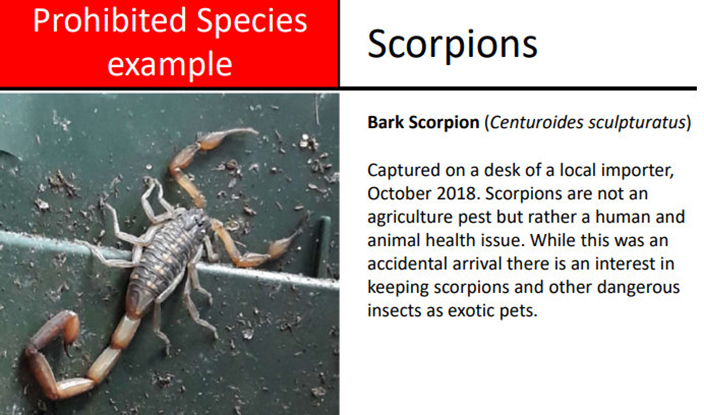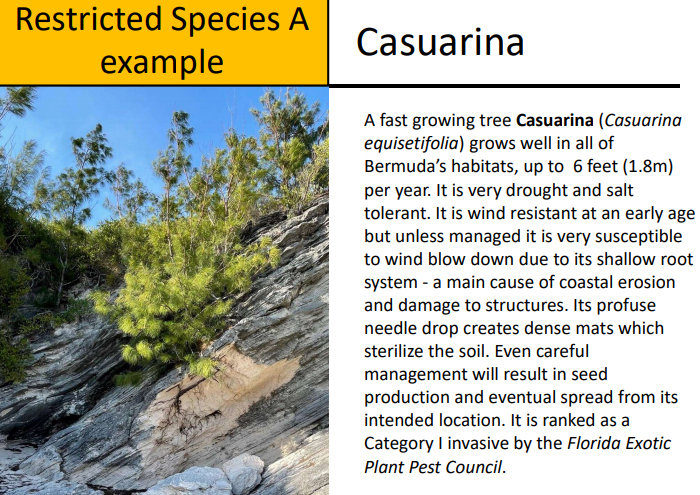‘Invasive Alien Species Act’ Public Consultation
The Government has opened public consultation on the draft bill called the “Invasive Alien Species Act 2021” which aims to “improve the island’s biosecurity by allowing for the assessment and listing of a pest species to the corresponding level of actions needed to minimize its impacts.”
The Bermuda Government’s forum website said, “Modern global travel is essential to Bermuda’s economic survival but it also makes the island increasingly vulnerable to the introduction and proliferation of invasive alien species [pests] that can and do have a negative impact on the island’s environment, economy, human health, and social fabric.
Extract #1 from the document
“The purpose of the Invasive Alien Species Act 2021 is to improve the island’s biosecurity by allowing for the assessment and listing of a pest species to the corresponding level of actions needed to minimize its impacts.
“The Act will [a] prevent the introduction of new invasive alien species, and [b] create controls to prevent the spread of any such species that have or do become established.
What are invasive species?
“Invasive alien species [IAS] are plants, animals, pathogens and other organisms that are non-native to an ecosystem, and which may cause economic or environmental harm or adversely affect human health. In particular, they negatively impact local ecosystems and ecosystem functions through competition, predation, or transmission of pathogens. Often the best indicator for invasiveness is if a species is known as invasive elsewhere.
Extract #2 from the document
“As an example of the range of challenges the island faces, in May 2018 Bermuda participated in the UK Overseas Territories Biosecurity Gap Analysis– Horizon Scanning Project and a follow up Bermuda-specific workshop in March 2019. The workshop compiled a list of some 148 pest species impacting the Caribbean region, but not yet present on all of the Overseas Territories. Each territory was asked to review this against potential biodiversity, health and economic impacts. In so doing Bermuda gained a better understanding of what species it should be watchful for. These included:
- reptiles e.g. snakes, mourning gecko and the green iguana;
- small mammals e.g. the mongoose, weasel, stoat, raccoons;
- terrestrial invertebrates e.g. Giant African Land Snail, fire ant, yellow crazy ant, Africanized honey bee, scorpions , Tarantula and Black Widow spiders;
- Fish and fresh water invertebrates [e.g. Piranha, Asian Green Mussel]; and
- plants e.g. Leatherleaf, Giant Sensitive Tree.
“It is also recognized that Bermuda already has problem pest species that need to be better controlled. Some efforts are already underway to manage these species but they are largely voluntary in nature and the good work being done can easily be undone as there is limited legislation in place to control the breeding, selling and release of pests into the environment. Species of note include plants such as Casuarina, Beach Naupaka, Pothos Vine and Umbrella Tree which are still sold commercially. As well as animals such as the Red Eared Slider Terrapin and the Lionfish which are both still popular in the pet trade.
Extract #3 from the document
“Vermin and feral domestic animals have not been included in the proposed legislation at this juncture. Vermin are already managed under the Public Health Act 1949 and domestic animals that have gone feral could be better managed under the Care and Protection of Animals Act 1975.
“Recognizing the need to better manage pests for the health of Bermuda, today and in the future, the Honourable Walter Roban JP, MP, Minister of Home Affairs presents the draft bill called the “Invasive Alien Species Act 2021” for public consultation.”
You can submit feedback here.
The full Invasive Alien Species Act 2021 Species Examples follows below [PDF here]:
Read More About
Category: All, Environment, News





Honestly with all the animals that were introduced to Bermuda over the years for the purpose of pest control, corn snakes or rat snakes would’ve been the best option. With the trash buildup and rat population exploding, snakes that eat rats would be a good option
Si it’s Goodbye to visitors from Mars and other Planets
(Invasive Alien Species).
Most destructive invasive species: HomoSapiens.